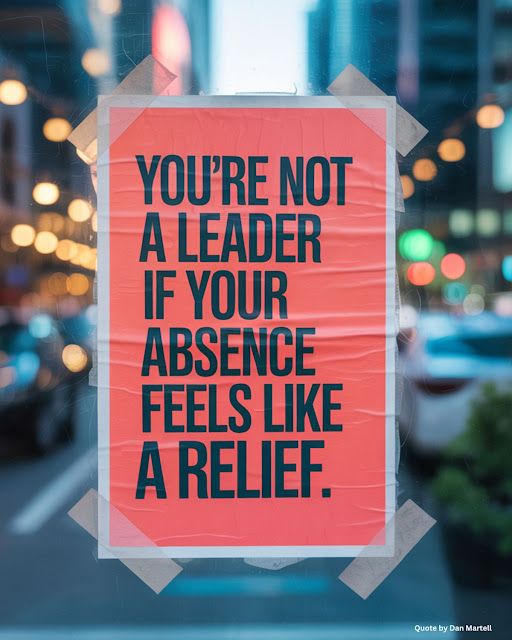💡You’re not a leader if your absence feels like a relief.
💡You’re not a leader if your absence feels like a relief.
In the modern workplace, leadership is often mistaken for control, authority, or being the loudest voice in the room. But in reality, great leadership is rarely about presence alone—it’s about the impact of that presence. And just as telling, perhaps even more so, is the impact of a leader’s absence.
When a leader leaves the room—be it temporarily during a meeting or permanently from a team—the emotional residue they leave behind speaks volumes. Relief shouldn’t be one of them.
🚨 If your absence brings calm, you may be managing through fear, not respect.
There’s a critical difference between a team that misses its leader and a team that breathes easier the moment the leader walks out.
If your team feels relief in your absence, it might be worth asking:
-
Are you fostering an environment of fear?
-
Do people hesitate to speak freely around you?
-
Are you micromanaging to the point of paralysis?
-
Do you correct more than you coach?
-
Do people feel judged, rather than supported?
This quote forces us to confront a difficult reality: being "in charge" doesn’t mean you’re being followed. It might just mean people comply—out of obligation, not trust. And where trust lacks, culture crumbles.
🧠 Leadership isn’t presence. It’s influence in your absence.
True leadership creates an ecosystem where people are empowered to do their best work—not only when you're watching, but especially when you're not.
Ask yourself:
-
Do your team members feel safe making decisions without you?
-
Is initiative rewarded or punished in your culture?
-
Do people grow in your presence and thrive in your absence?
A leader’s true legacy is not what happens when they’re in the spotlight—it’s what the team accomplishes when they’re off stage.
🙌 Emotional aftershocks: The “vibe” you leave behind
Leaders leave behind emotional signatures. After every interaction, you leave your team feeling one of the following:
-
Inspired or diminished
-
Safe or guarded
-
Trusted or micromanaged
-
Energized or drained
If your absence creates relief, it suggests that your presence may have created pressure, tension, or anxiety. That’s not sustainable—and it’s definitely not leadership.
💬 What do your team members say when you’re not in the room?
Here's a truth that stings: your reputation as a leader is not what people say to your face. It's what they say when you're gone. And if they say:
-
“It’s so much easier to talk openly now…”
-
“We can finally breathe…”
-
“Let’s get something done while they’re away…”
Then you're not leading—you’re looming.
👣 Transforming from a source of stress to a source of strength
The good news? Leadership is learned, and awareness is the first step toward better.
Here are 5 self-reflective questions to turn this insight into action:
-
When I leave the room, what emotional state do I leave behind?
-
Do I create psychological safety, or do people filter themselves around me?
-
Have I asked my team for honest feedback about how they experience me?
-
Am I developing other leaders, or just followers?
-
Would I want to be led by me?
💬 In closing...
Leadership is not about your ego. It’s about their energy.
If your team only exhales when you’re gone, you haven’t created a high-performing team—you’ve created a performance for you. That’s not sustainable, and it’s certainly not scalable.
A great leader's absence should feel like a gap, not a relief. Like a missing force, not a removed obstacle.
So, ask yourself again—what do people feel when you're not there?
That answer may be your most honest leadership scorecard yet.







Σχόλια
Δημοσίευση σχολίου